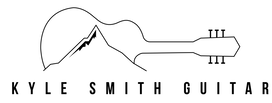|
Arpeggios are an important skill to develop for all jazz guitar players.
They are a foundation of jazz language and being able to navigate different chord changes that pop up in songs. Arpeggios for jazz guitar can also be a real point of frustration as you get going. It can seem like there's tons you have to do. Because on the surface, you can look and find hundreds of variations on different ways to play arpeggios all over the neck. And it can seem really, really difficult for you to put any of this to use. All you have to do is go on reddit up and look up jazz guitar arpeggios, and you'll find a laundry list of things you're somehow supposed to get under your fingers. Because supposedly you have to do X, Y and Z before you're allowed to play jazz guitar. It really doesn't have to be that bad. This topic of arpeggios comes up in my jazz guitar lessons all the time, especially when I'm talking to newer or self taught jazz guitar players who've been trying to learn online. So today, let's look at a different approach to learning your arpeggios and what you can realistically expect from practicing them and just a few different tweaks to make this a little bit more manageable for your practice.
0 Comments
 Learning how to use guitar scales is an important part of learning to play guitar. Scales provide a path towards improving your finger coordination while opening doors to learning more about music theory, learning songs by ear, and playing guitar solos. Musically speaking, there is no difference in scales played on the guitar, and scales played on any other instrument. Physically, the mechanics of the instrument dictate how the scale is played. With guitar scales, we are looking at finger patterns that can be used to play a specific scale at different points on the neck. Typically these finger patterns are what we call movable patterns - you can move them up or down the guitar neck and be able to play the same type of scale (and the same pattern) from different starting notes.  Arpeggio patterns are a useful skill for any guitar player. These patterns help you outline chords in your solos, improve your technical skills, and can help you master the guitar fretboard as you learn them. Dominant 7th is the full name of a chord quality that you are probably already familiar with, whether you realize it or not. A G dominant 7th chord symbol would be G7. Most of us have learned these simply as "7th chords" - I'm going to be a little more specific in this lesson because there are different types of "7th chords" that you might learn later on. With arpeggio patterns, you are playing the notes from a chord one at a time - almost like a scale pattern. If you play a G7 arpeggio, you are playing a G7 chord in a way that you can use for playing melodies, riffs, or guitar solos. These arpeggio patterns will challenge your fingers to move in new ways, adding a new layer to your technical skills and abilities. By playing these arpeggio patterns from different starting notes on each string, you can play in any key, anywhere on the guitar fretboard. Dominant 7th arpeggio patterns are found in many musical styles, including jazz, rock, blues, country, and other popular styles. No matter what kind of music you want to play, these arpeggio patterns will come in handy.  Major scales are important for all guitar players to learn. These patterns form the foundation of our musical system - knowing your major scales will open up many more possibilities for what you are able to play and understand in music. For guitar players, knowing how to play major scales can help you master the fretboard, play by ear, and develop your technique. Most of our music theory works in relation to the major scale, so working with these patterns will give you the tools you need so you can understand music better, and communicate with other musicians. These scales are important for every style, and if you want to learn to play jazz guitar, learning your major scales is an essential first step. Note: this is the third article in a short series designed to help you play your guitar more often, because the more you play your guitar, the better you'll get! If you haven't already, check out part 1 and part 2. 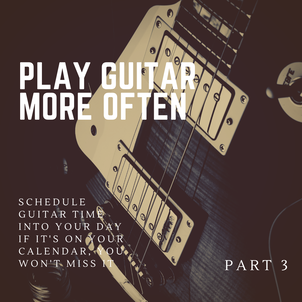 The more you play your guitar, the better you will get. So far in this series we've looked at keeping your guitar on a stand, and building a habit around something else you do on a daily basis. While both of these are great strategies, it's worth developing a wider toolkit for getting your guitar practice in. I've found over the years that it sometimes takes a variety of tools to keep yourself moving forward. Habits may work for a while, but then your schedule changes. You keep the guitar on a stand in your living room, but now it's summer and you're spending your time outside. Whenever one strategy stops helping you play more, you can always change your approach - if you have more than one trick up your sleeve. This lesson will focus on scheduling guitar practice into your day. It can be as simple as a reminder on your phone, or an entry into your calendar app. Just something to give you a little nudge to pick up your guitar. Note: this is the second article in a short series designed to help you play your guitar more often, because the more you play your guitar, the better you'll get! Check out part 1 here. 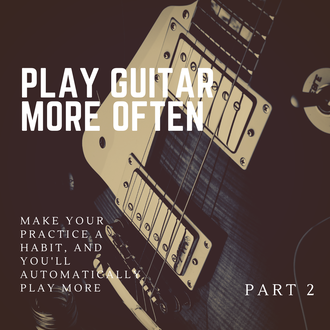 If you want to improve your guitar playing, you need to spend time playing guitar. It seems obvious, but sometimes we need to have these things spelled out for us. In part one of this series, we looked at making your guitar visible so you'll be more likely to pick up your guitar and play it. In this lesson, we are going to explore creating a habit of playing your guitar more often. It takes a little bit of thought and willpower up front, but before too long you'll be picking up and playing your guitar almost automatically each day.  The best guitar players I've met are the ones who play guitar the most. This goes for the professionals I've worked with, and students of mine who have become great players themselves. You don't have to practice for hours at a time to get good at playing guitar. It does help if you play your guitar regularly though. Even a few minutes a day can help you start to improve if you do it often enough. Note: If you want to become a professional, you have to put in the time. There's no way around that - in college, music majors are expected to practice a minimum of 4 hours each day. If you're playing for fun, you'll be surprised at how much you can improve with a little bit of time each day. The biggest hurdle you face in your own guitar playing is making sure you're playing your guitar regularly. Playing for an hour a couple of days out of the week is not going to help you as much as playing guitar for a little bit of time each day. Make it a goal to play guitar on more days than you don't play guitar. (Even if it's just for a couple of minutes - it's worth it) Over the next few weeks, we'll look at some simple ways you can start playing your guitar more regularly. Click the "Read More" button below.  Major 7th arpeggios are an important skill for any jazz guitar player to have. Practicing these arpeggio patterns will help you improve your technique in both hands, develop ideas for improvisation, and learn the notes on the guitar neck. You are also training your ears and fingers to find notes that are a part of the major 7th chord - so when you see one written on the page (or recognize the sound when you hear it), your fingers know what to do already. 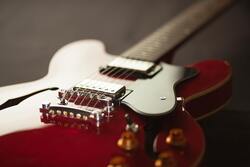 Whether you're playing blues, rock, country, hip hop, or jazz - the minor pentatonic scale is going to be a helpful tool for you to have at your disposal. This is a foundational pattern that appears in many styles of music from around the world, and opens the door for learning new techniques and improving your guitar playing skills. In minor keys, the minor pentatonic scale is going to be your best bet for improvisation most of the time - at least as a starting point.
For many styles of music, these patterns make up 80-90% of the material you need for playing solos. Once you have your pentatonic shapes down cold, they will also give you a framework you can use to easily learn your other minor scales on top of. 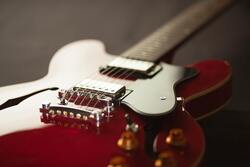 The major pentatonic scales are an important building block for playing melodies and improvising solos on the guitar. These patterns are important for all styles of music, and especially helpful when you’re learning to play jazz guitar. These scales can be a helpful go-to source for material when you are improvising on a major blues progression, or with other progressions that stick mostly to a major key. To get the most out of this lesson, you’ll want to know the notes along each of the guitar strings. If you’re not comfortable with that yet, click here to get started. If you’re in a hurry to get these scales under your fingers and playable, don’t worry! I’ll include a fretboard map here to show you what you need to know. The pentatonic scales are helpful for a couple of reasons:
|
